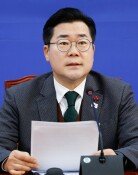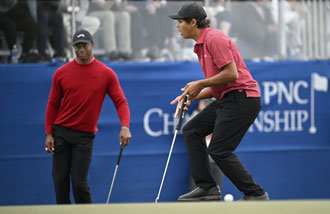[Opinion] North Tempest Also Blows in Japan
[Opinion] North Tempest Also Blows in Japan
Posted July. 07, 2004 22:16,
Ahead of the Upper House elections on July 11, all eyes in Japanese politics are on Jakarta, Indonesia. This is not because they are interested in the results of the Indonesian presidential race, which will likely see a run-off, but because Soga Hitomi, who was abducted to North Korea, will meet with Charles Robert Jenkins, the American GI who defected to the North with whom she married, and also her two daughters in the city. The Japanese press reports that the North tempest blowing from Jakarta would be the largest variable that could change the political equation for the elections.
The current race for the Upper House has been an uphill battle for the ruling Liberal Democratic Party (LDP) because of a number of unpopular issues such as the Japanese dispatch of troops to Iraq and the partys pushing through of a revision of the pension law. The approval rate of the current government fell more than 10 percent in the past month. As projections that the LDP will unlikely win 51 out of the 121 seats in the Upper House spread, analyses began to tilt in favor of unseating Prime Minister Koizumi Junichiro. A cornered Koizumi will use the family reunion of Soga as a hidden card. North Korea was fully cooperative in the Japanese governments efforts to move up the date of the union right ahead of the elections. Chief Cabinet Secretary Hosoda Hiroyuki went to exceptionally extra lengths and expressed gratitude to North Korea. He said, Thanks to North Korea, the reunion will take place sooner than expected.
Prime Minister Koizumi has said on a number of occasions that he will conclude the negotiations over normalization of diplomatic ties between North Korean and Japan before September 2006 when his term expires. Kim Jong-il, chairman of the Norths Defense Committee who is in dire need of Japanese aid for the countrys economy, probably believes that it would be better for him not to see his Japanese counterpart being replaced. In this respect, the North tempest is the joint work by the two national leaders. While they criticize the reunion as a public stunt with some ulterior motive, the Japanese opposition parties clearly look anxious about the possible strength of the North tempest.
The North tempest, the staple in every election in South Korea, begins to blow across the sea and hits Japan. As far as the influence it can bring on the elections, North Korea, as its official slogan describes it, is the Great Strong Country. If it can wield influence on the Japanese election, the North Korean leadership may be tempted to be a variable in the U.S. presidential elections in November. What if the North does not want the reelection of George W. Bush? Then, itd better stay quiet instead of causing international conflict with its development of nuclear weapons or test-firing missiles.
Park Jae-won, Tokyo correnspondent parkwj@donga.com
Headline News
- Former commander's notebook includes potential plan to incite N. Korean attacks
- Constitutional Court to proceed with impeachment trial on Friday
- Deputy PM confirms next year’s under 2 percent growth projection
- Ukraine says Russia uses fake IDs to hide N. Korean troops
- Pres. Yoon refuses impeachment documents for a week







